Raising Muscovy Ducks
This post may contain affiliate links, view our disclosure policy for details.
Raising Muscovy ducks is very easy. They are easy to care for, friendly and a great dual-purpose duck to have on the homestead. In this post, you’ll find all the information that you need about raising Muscovy ducks.
I’ve been raising Muscovy ducks for a few years now and I can tell you, hands down, it’s the easiest animal I have ever taken care of. Or in other words… They pretty much take care of themselves.
I started my Muscovy duck journey with two females (hens) and one male (drake) that my ex-husband picked up from friends and this trio multiplied very quickly and became a great source of food for us.
But there is so much more to Muscovy ducks than just food production! We are going to go over all the benefits of raising them and all the questions that you might have. Let’s jump in!
Raising Muscovy Ducks…
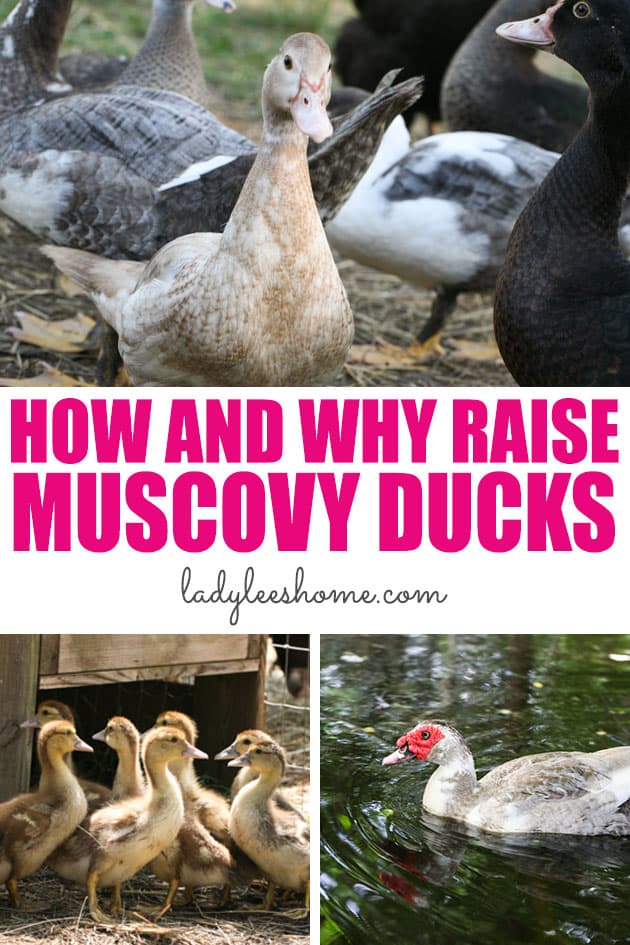
I am going to try to answer all the questions that you might have about Muscovy ducks. I hope that if you are considering this amazing breed of ducks this post will give you all the info that you need to make a decision.
If at the end of this post you have additional questions, feel free to post them in the comments.
Origin of Muscovy Ducks…
Muscovy ducks are native to South America and you can still find them roaming around wild in the jungles there.
Their original name was Musco ducks because they eat so many mosquitoes. The Russian Muscovites were the first to import them into their country and raise them domestically; this is where the name Muscovy came from.
They are the only duck that is not derived from the mallard duck. In fact, they are not considered a duck. They are a large waterfowl, something between a goose and a duck.
What do Muscovy Ducks Look Like?
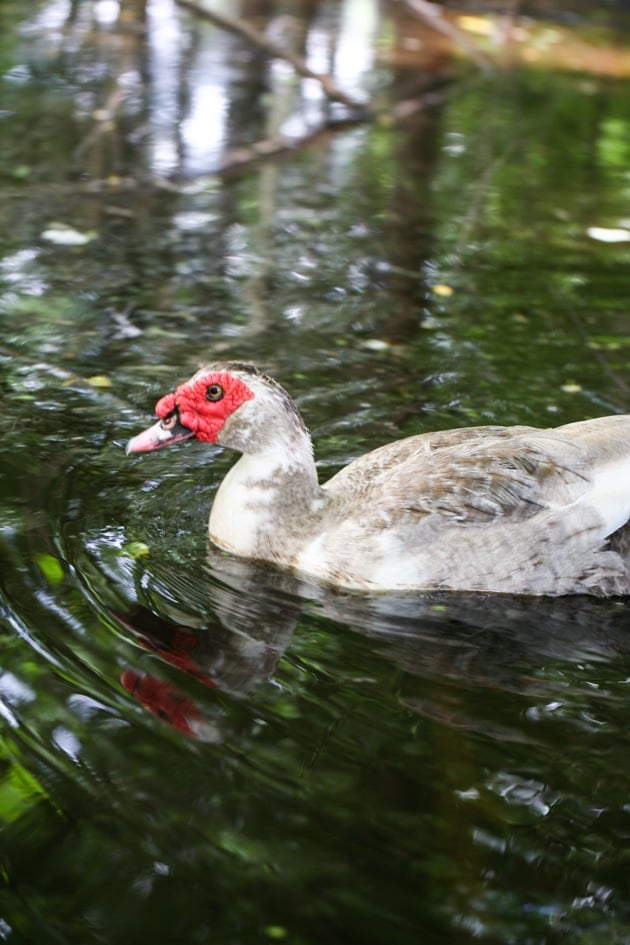
One of the most known characteristics of Muscovy ducks is their large red, warty caruncles on their head. They appear when the duck reaches maturity around 5-6 months of age. The male Muscovy has a larger mass of them while the female only has a red mask around her eyes.
Note that in this post, you’ll see a lot of pictures of my Muscovy ducks without the red, warty caruncles, this is because they are still young, probably around 4 months of age.
Muscovy males are large. They can reach 15 lb while the females are smaller and can reach about 9 lb.
Muscovies have many different and beautiful colors. They can range from black to brown to grey or white or tan and one duck can have more than one color.
Do Muscovy Ducks Quack?
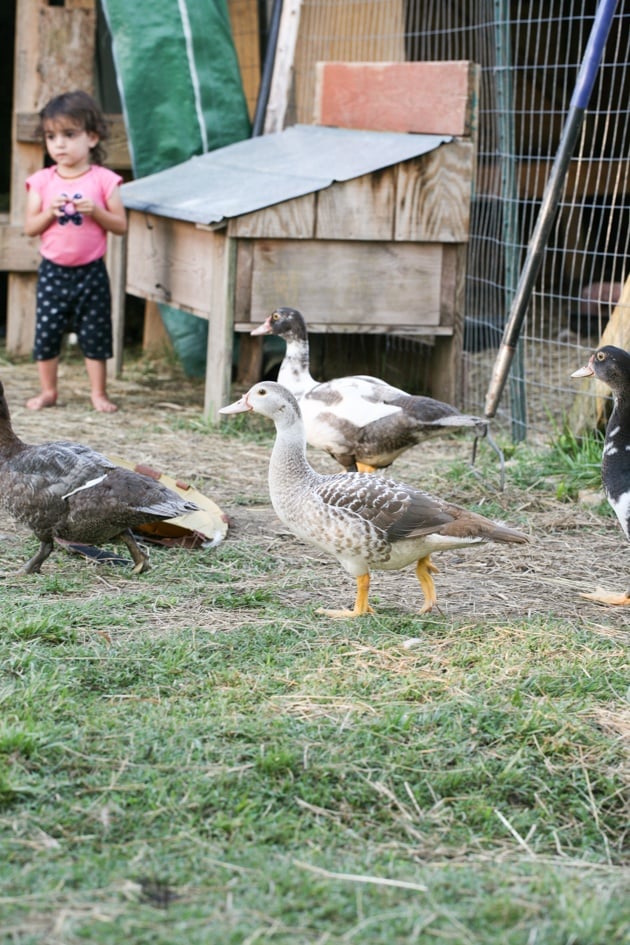
No! Muscovy ducks don’t quack. They do make a hissing noise mainly when they talk to each other but it’s not a loud noise. For the most part, they are very quiet ducks.
This might be a pro or it might be a con to owning Muscovy ducks depending on what you like. I generally prefer quiet! I owned Guinea fowl before and just about lost my mind with the amount of noise they made.
What do Muscovy Ducks Eat?
Muscovy ducks eat chicken feed, bugs, flies, mosquitoes, greens and kitchen scraps, bread and pasta, and fish.
If your Muscovy ducks are free-range, they don’t need you to feed them a whole lot even when they are very young. They will clean your yard of ticks and other nasty bugs.
You’ll see them eat some grass and other greens (yes! They will eat your garden if they can access it) as well.
But maybe the best thing about Muscovy ducks is that they love eating flies and mosquitoes! You’ll literally see the ducks catch the flies in the air as they fly by. When it comes to mosquitoes, they’ll either eat adults or they’ll eat them at the larva stage.
Let me tell you a story… I moved to my house in the country in 2016. The house was abandoned for 7 years. There was trash everywhere, standing puddles of water, and an overgrown lawn.
Right next to the house there is a pond. But it’s not really a pond, more like a swamp. It’s shallow and fills and dries depending on the rain.
A perfect breeding ground for mosquitoes, ticks, chiggers and so on.
Even though we cleaned the place, it was still impossible to sit outside on the porch, the mosquitoes were just unbearable! This went on for a year. Then, we got our three Muscovies… Within 3 months, the place was cleaned up completely.
Since then, I have maybe 10% of the flies that I should have with all the livestock around me and not a single mosquito in sight! For me, this is a great reason for owning these amazing ducks!
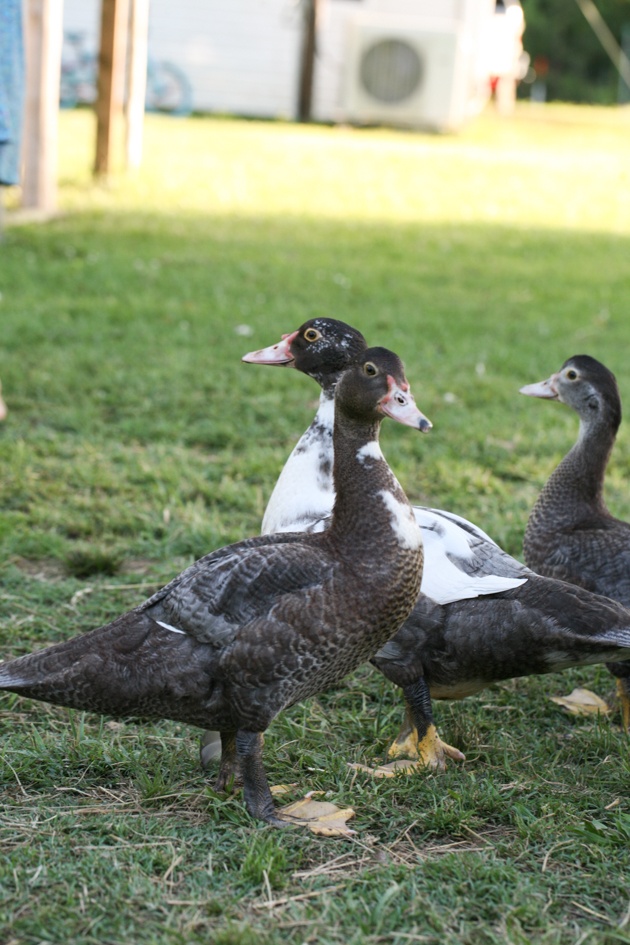
Even though they can forage and take care of themselves, I still feed my free-ranging ducks a couple of cups of chicken feed in the morning, just to get them used to me and to a routine.
If your Muscovy ducks live in a fence they will depend on you to feed them…
Ducklings – ducks grow very fast and so they need feed that is rich in protein. Non medicated chick starter feed with 20-22% protein is a good choice. Feed it free choice.
Young ducks and adults – I find that after the first three weeks Muscovy ducks can transition to adult feed with no problem. Feed 16% protein chicken layer feed either free choice or at least eight ounces per duck per day.
You can also feed your ducks corn, herbs, kitchen scraps, weeds, old bread, fish, old cheese, and so on.
Always make sure that your ducks have plenty of water! Muscovy ducks love washing themselves and they drink a whole lot. Like any other duck, they make a mess of the water so make sure to clean and change the water daily.
This is a great article on how to feed ducks if you want to dig even deeper.
Do Muscovy Ducks Need Shelter?
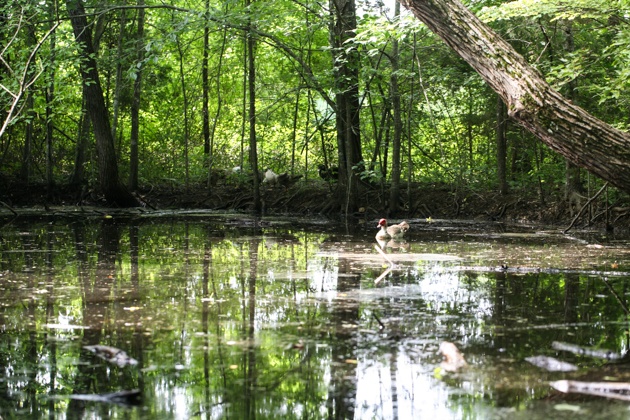
Muscovy ducks only need shelter for their nests or if you live in a very cold climate. They don’t mind the rain, they don’t mind the cold, they don’t mind the snow, and they don’t need you to supply them with roosting bars because they prefer the ground.
They are very hardy ducks and easy to care for! My ducks do have shelter but I never see them use it. I’ll see them stand in the rain and enjoy it. Even when we get some snow, they still stay outside.
Now, I am in the South and it never gets below zero here. We also don’t have a whole lot of snow. Maybe if you live in Alaska it makes sense to make sure that they have a protected place to hang out in during the winter.
However, they do need a protected place for their nests. Something like a nest box or access to the floor of the chicken coop or maybe access to an old shed or some sort of outbuilding. My free-ranged ducks love making a nest in my dog’s house! You’ll learn more about their nests below.
Are Muscovy Ducks Friendly?
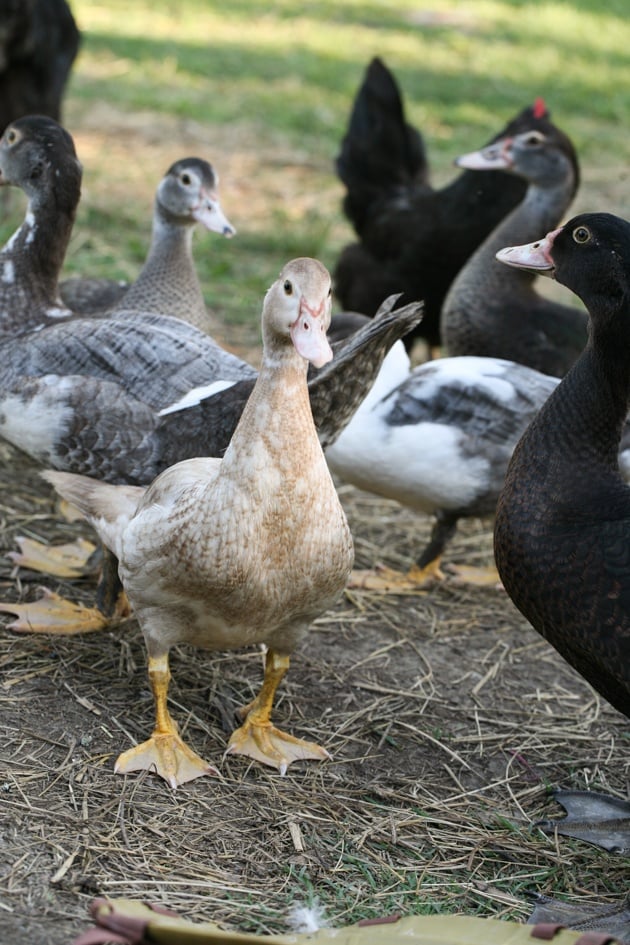
The only time that Muscovy ducks are not friendly is when they have their young with them. A mother Muscovy duck will try to make sure that no one gets closer to her ducklings. Other than that, they are VERY friendly ducks!
They will eat from your hand and follow you everywhere like dogs. They are very slow (which makes them easy prey if they are free-rangers) and easy to catch.
They generally get along very well with other animals! I raise my ducks around my dog and cat and they live with the chickens and goats.
They get along very well with the other animals. Usually, it’s the chickens that are mean to them and I need to keep an eye on and deal with a mean hen.
Between them, they get along very well. The only time that I had an issue was when I had too many drakes in one fence. They kept fighting with each other and with the roosters and I had to get rid of a few. This is normal behavior for most animals.
If your Muscovy ducks are fenced, make sure that you don’t have more than one drake for four hens.
When do Muscovy Ducks Start to Lay Eggs?
Muscovy ducks start mating and laying eggs around 7 months old. The female chooses a location for her nest and keeps coming back to the same nest. If you have a few females, each one of them will have her own nest.
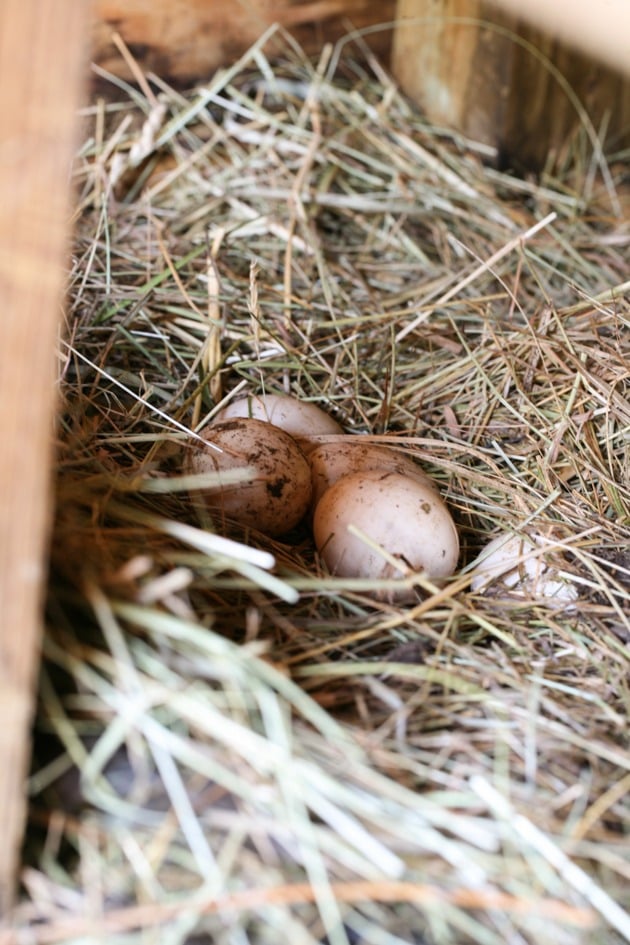
They mostly make their nests on the ground in a protected area. They might choose to make their nest under the goat’s milk stand, in an empty bin, or under the wooden pallet that holds the hay bales.
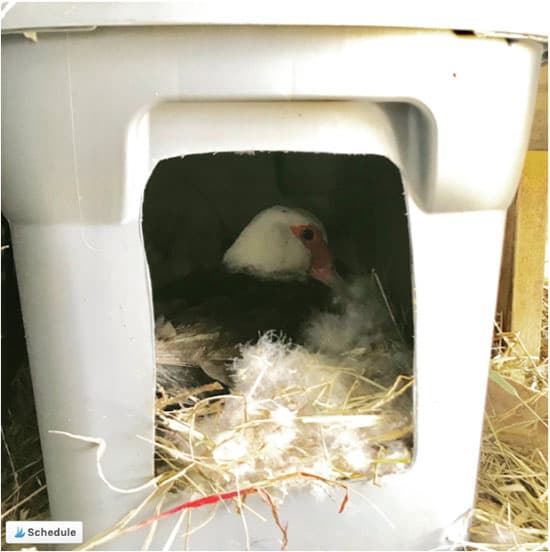
They pluck some of their breast feathers and use straw to make their nest.
They lay one egg a day in that nest and if you leave the eggs in the nest, the hen will start sitting on the nest when it has 6 or more eggs. Most of my hens go broody when the nest is 12 to 17 eggs large.
It takes 35 days for Muscovy duck eggs to hatch. During those days the hen doesn’t always stay on the nest. She might leave the nest for a little while and go to eat or wash.
This might be a little strange if you are used to chickens. Broody hens will not leave the eggs and chicken eggs have to keep a certain constant temperature in order to hatch.
At first, when I saw my broody Muscovy hen get up and leave her nest I thought that the eggs were ruined. But trust the duck and don’t touch the eggs! She will be back and all will be fine. She knows very well what she is doing!
You can watch a video of my first Muscovy ducks hatching on YouTube HERE.
Muscovies do not lay eggs year-round. They start when the weather starts to get warm in the spring and stop when the weather cools down. Here in the South, their season is between March to October. Then they will take a break for the winter.
During their season, they can sit and hatch two to three nests. If each nest has 10-15 eggs in it you can imagine how fast the Muscovy population in your homestead can take off.
I manage that by collecting some of the eggs and butchering some of the ducks.
Are Muscovy Ducks Good Mothers?
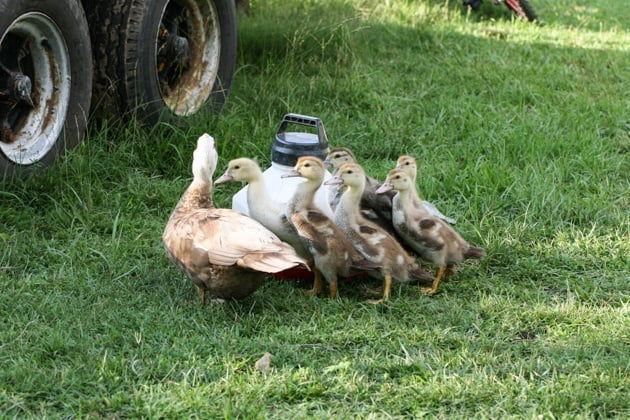
Muscovy ducks are the best mothers. They take very good care of their young and they are very protective of them. In fact, Muscovy mothers are pretty aggressive and won’t let anyone close to their babies!
Once all the eggs hatch the mother will spend two more days in the nest with the babies. She will clean her babies and won’t leave them for a moment. She doesn’t show up for feeding those days and I don’t feed her or bring her water. I just let them be.
After a couple of days, they will leave the nest and just walk around. Sometimes they come back to the nest for the night and sometimes they find another spot.
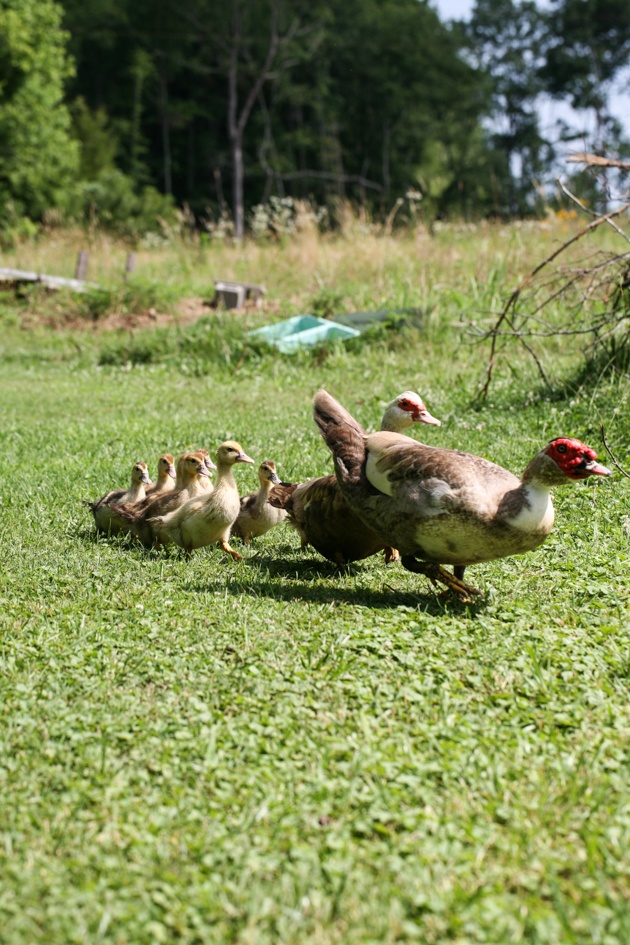
The young ducklings will always stay behind their mother. If your ducks free-range they’ll walk around and hang out by a water source like a pond if one is available.
Take into consideration that the little ducklings are very easy prey. Many times I had mothers go into the woods with 10 ducklings and come back with 6.
You can choose to grab them after they hatch and move them to a brooder for a few weeks for their protection. Make sure to relocate the mother as well so she knows where her ducks are.
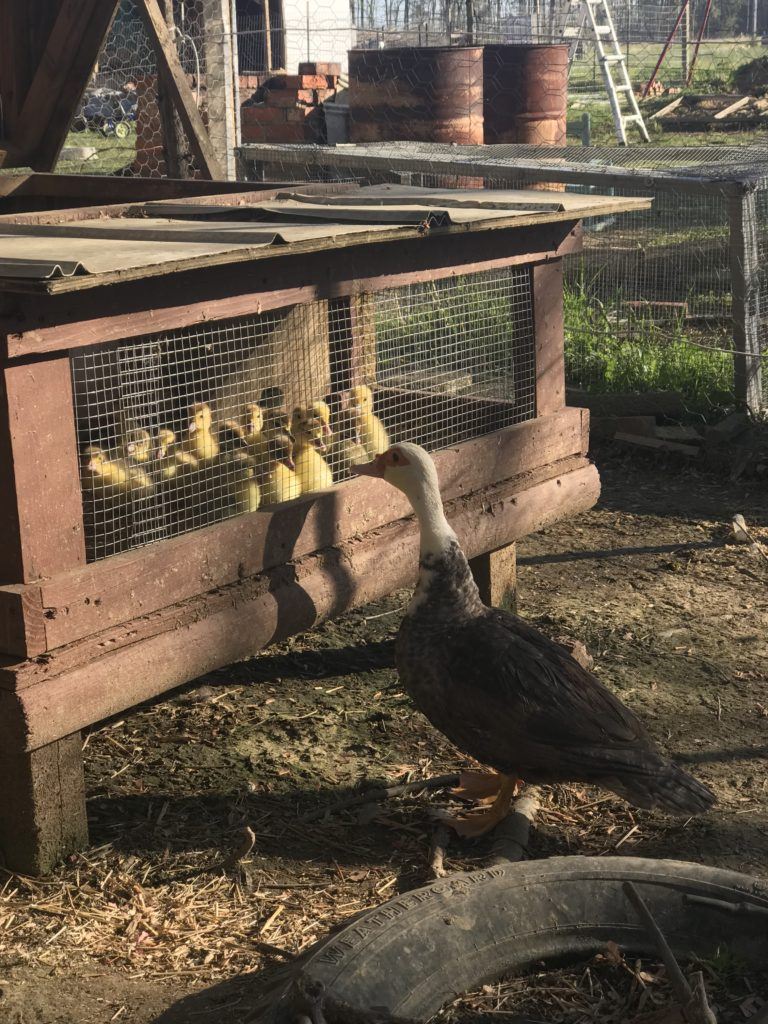
I sometimes move them to a brooder that has an open top. This way the mother can fly in and out. She can go wash and eat and come back.
If your ducklings don’t free-range, you’ll have to make sure that they have water and feed. Make sure that the water dish is not deep. They will most likely play in the water and if it’s deep and there is no easy way for them to get out they will drown.
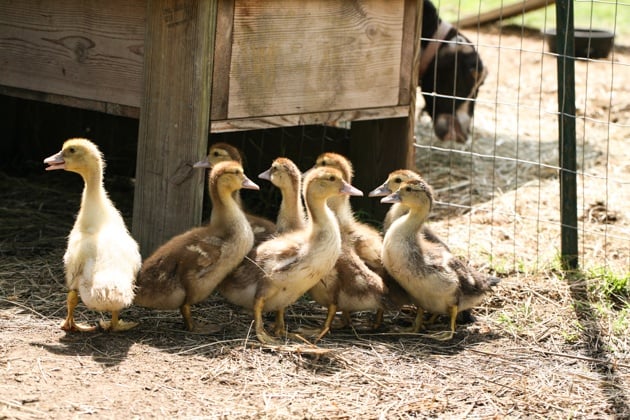
Ducklings grow very fast and somewhere between four to six weeks they no longer need their mother. She will take a little break and then she’ll start mating and laying eggs for the next nest.
How to Tell the Sex of Muscovy Ducks…
When Muscovy ducks reach maturity it’s easy to see which one is a hen and which is a drake. The drakes are considerably larger than the hens and they have a larger mass of red caruncles on their head.
When they are young ducklings, sexing is a bit more difficult. I look at their tail. The drakes will have a much fatter tail than the hens. Still, it’s not easy to sex them when they are young.
This video will show you how to sex day old ducklings. I’ve never tried it but this might be a reliable method.
Do Muscovy Ducks Fly?
The drakes can fly but not very well since they are pretty heavy-bodied. I see my male ducks fly very low, just a few feet off the ground and not very far or often. The Muscovy hens fly very well.
The hens fly all over and around the homestead and often land on the roof of the house and just hang out there for a while, walking from here to there.
It’s very cute to see them up there on the roof but not always a great thing… I have a friend that is now dealing with a leaking roof because the ducks messed with the seal around the vents.
If you don’t want to have your ducks free-range and fly and prefer for them to be fenced and not fly around, you can clip one of their wings just as you would do with chickens. I show how to do this in my post about clipping chicken wings.
Will Muscovy Ducks Fly Away in the Winter?
Muscovy ducks don’t care much about the cold and even though they are a wild kind of duck, they are also very domesticated and love having a home. They don’t fly away in the winter.
I have never had my ducks take off even though they were free. They love staying around the house. They come back every morning to eat the feed that I throw on the ground for them. They make their nests around the homestead even though they can go and find a hollow log or a bush nearby.
I do get emails and comments from people who walked out of their house one day and found a Muscovy duck by their pond (check the comment section of this post). So I guess that sometimes they do fly around but for the most part, if you provide them with a good home they will stay around the homestead.
Raising Muscovy Ducks For Egg Production…
Muscovy ducks are not an egg-laying machine. Not at all and I don’t recommend choosing them if egg production is your main goal. A hen might lay 80-120 eggs a year.
Don’t get me wrong, their eggs are amazing. They are the size of a very large chicken egg, the shell is creamy white and very strong, and the yolk takes most of the space in the egg. Their eggs are rich and very tasty.
We eat their eggs just as we eat chicken eggs and I also use them for baking (they make the best baked goods! I use them in my pumpkin bread, sweet potato bread, apple cake, challah bread, or any other bread or cake that calls for eggs).
They just don’t lay a ton of eggs which is the reason that I won’t keep them mainly for egg production.
Raising Muscovy Ducks For Meat Production…
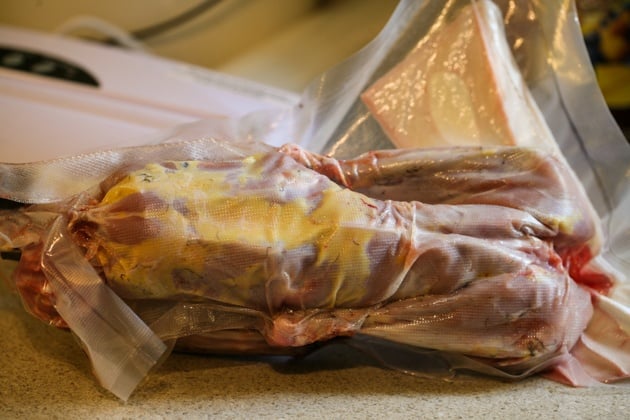
Muscovy ducks are a great source of meat especially for those of us who are looking to become more self-sufficient. They might take a little longer than other breeds of ducks to mature but they lay, hatch, and care for their own young.
Here is the thing… Meat breeds can’t reproduce. So, if you raise Cornish Cross chickens, for example, you butcher them at 8-9 weeks and you have to turn to the hatchery to purchase your next batch of meat chickens. You are depending on the store.
If you don’t want to do that and you decide to raise a heritage breed that moves around, behaves like a normal chicken, and can reproduce (I chose Black Australorps), you are probably looking at 6-8 months for those chickens to reach their full size.
Muscovy ducks are not engineered, they can reproduce very well (one hen can hatch 30 to 50 eggs in a season), they are great mothers (saving you all the work of raising babies), AND they reach butchering size in 3-4 months old. Half of the time that it takes a heritage chicken.
Add to that the fact that their meat is great… Mostly dark meat and very lean (98% fat-free) making it a very healthy kind of meat and you have a great duck for self-sustained meat production.
Also, you should know that Muscovy duck meat is Kosher. So if you are Jewish and follow a Kosher diet, these ducks are a great source of meat. If you’d like to learn more about why Muscovy ducks are Kosher, this is a great article.
Butchering these ducks is exactly the same as butchering chickens or butchering turkeys. Here is a step by step tutorial on how to butcher a duck.
Muscovy Ducks: Pros and Cons…
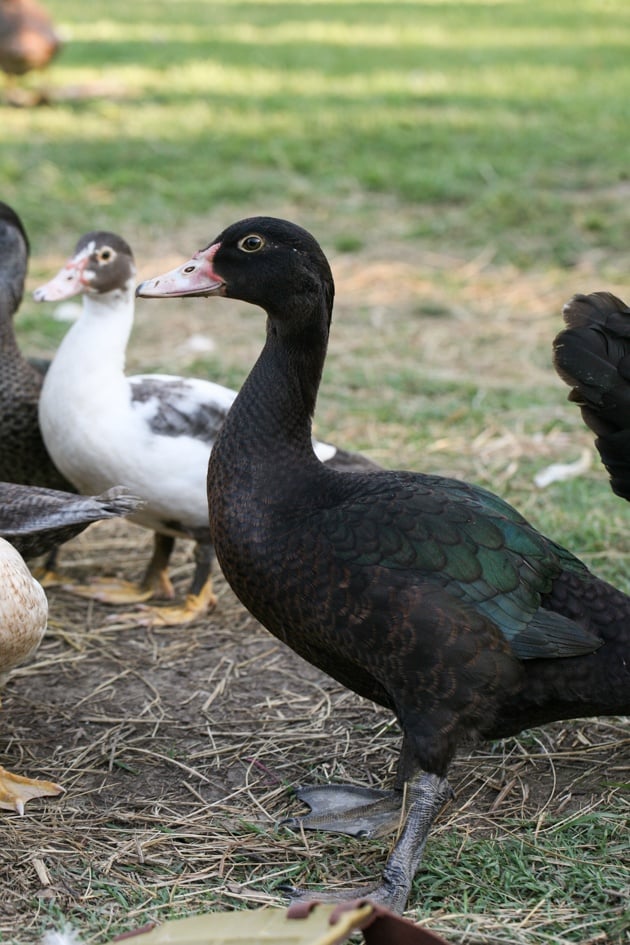
I know that this was a lot of information! Let’s make a quick list of pros and cons of owning Muscovy ducks so you can decide if they are for you…
Muscovy ducks pros –
- Friendly birds – they are friendly (apart from when they care for their babies) toward humans and other farm animals.
- They can help you control the fly and mosquito population – if you raise cows or other livestock you should consider adding a few Muscovies to the farm. They will reduce the fly population dramatically. Also, it might be a good idea to raise Muscovies in the bee yard if you keep bees. They’ll protect the hives from crawlers, wasps, and so on.
- They eat ticks and other parasites – they can help clean your yard.
- They don’t scratch or dig – as opposed to chickens, Muscovy ducks don’t scratch, dig, and make a mess.
- Great eggs – their eggs are the size of a large chicken egg. Large yolk, rich, and very tasty.
- Great meat – their meat is 98% fat-free, dark, and delicious. It is also Kosher.
- Great mothers – Muscovies will take care of their babies, saving you the need to hatch or purchase and raise ducklings.
- Quiet – they don’t quack. This may be a pro or a con for you.
Muscovy ducks cons…
- Slow, easy prey – if your ducks free-range you might lose some to predators.
- Don’t lay many eggs – around 80-100 a year.
- They fly – this might not be an issue for you but take into consideration that they can land on roofs and poop and such.
- They poop a lot – oh well, this is true for any duck… They just poop a whole lot!
I hope that this post gave you enough information to decide whether you want to raise Muscovy ducks or not. They are a great breed of duck to add to any homestead in my opinion.
If you have any questions, please feel free to post them in the comments. If you are raising Muscovy ducks please share your experience with us in the comments below.


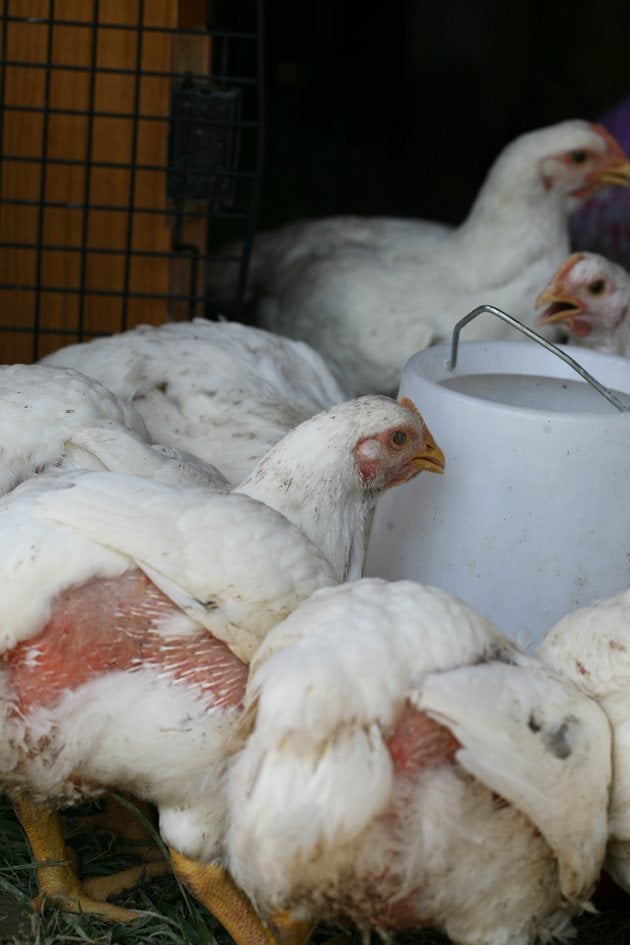
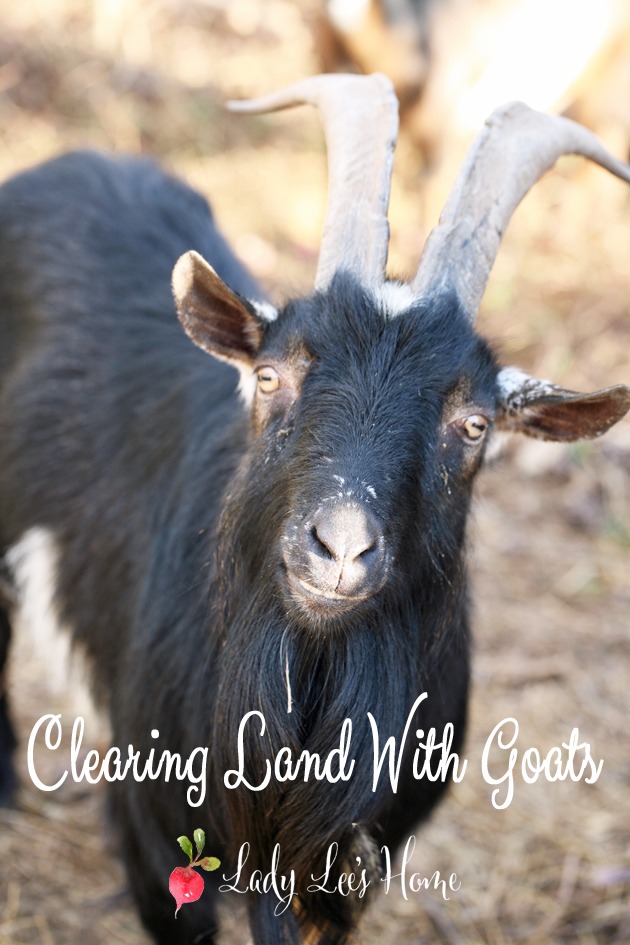
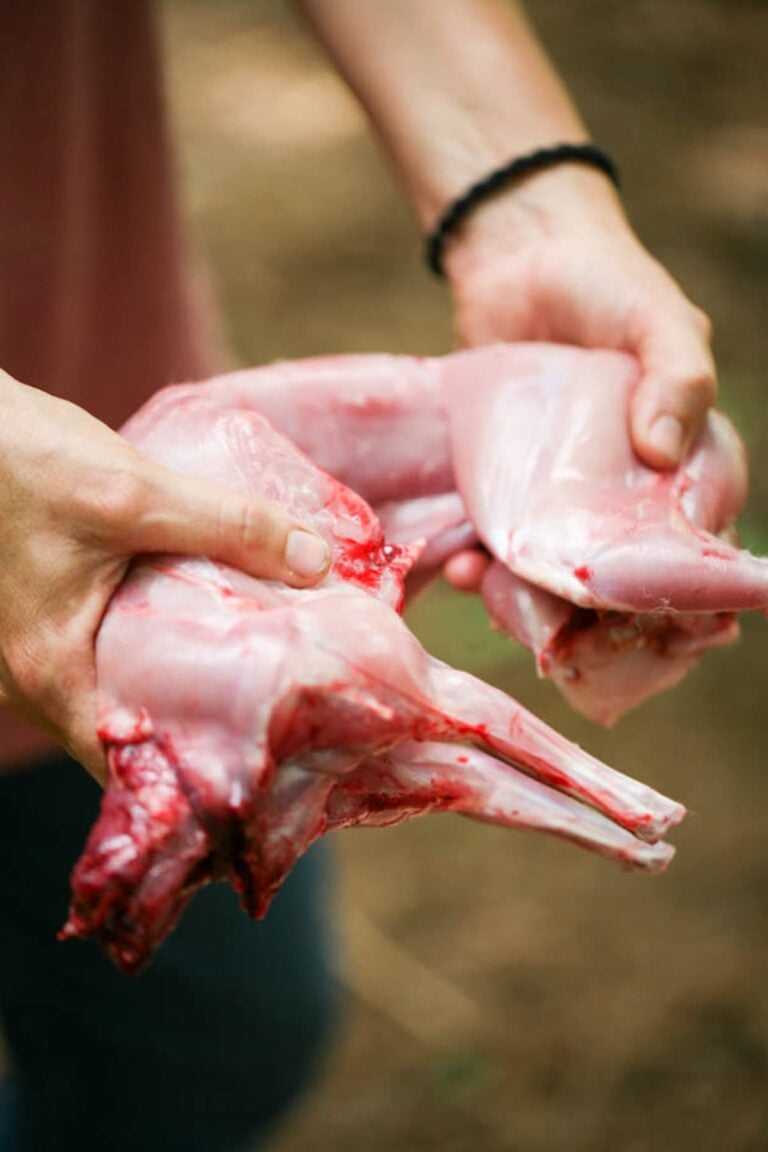
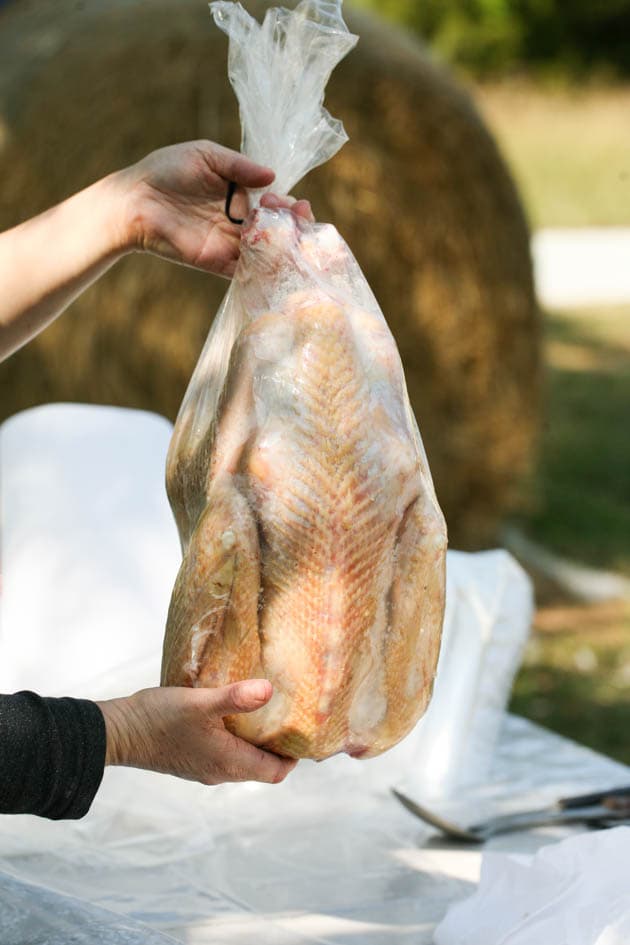
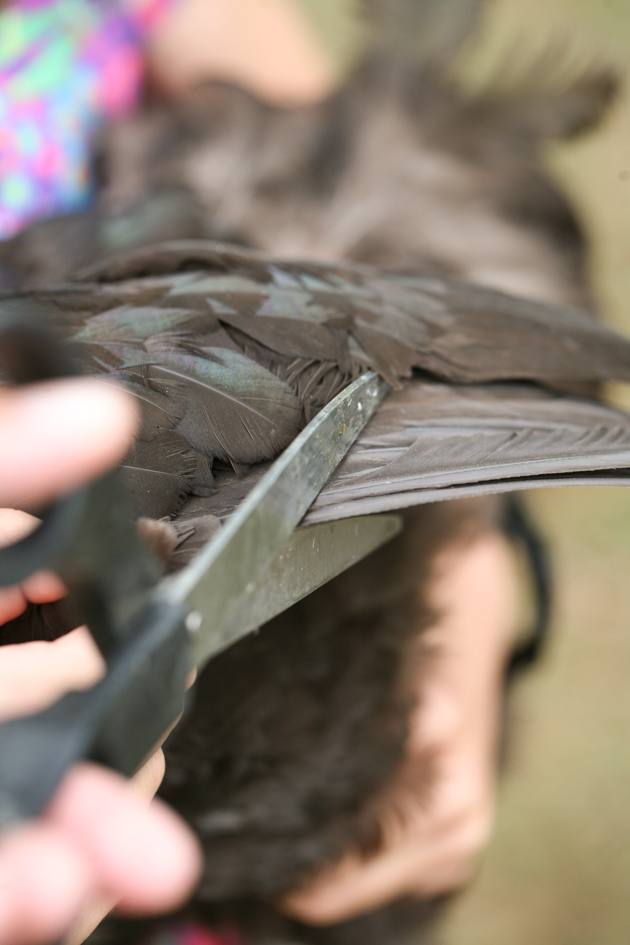
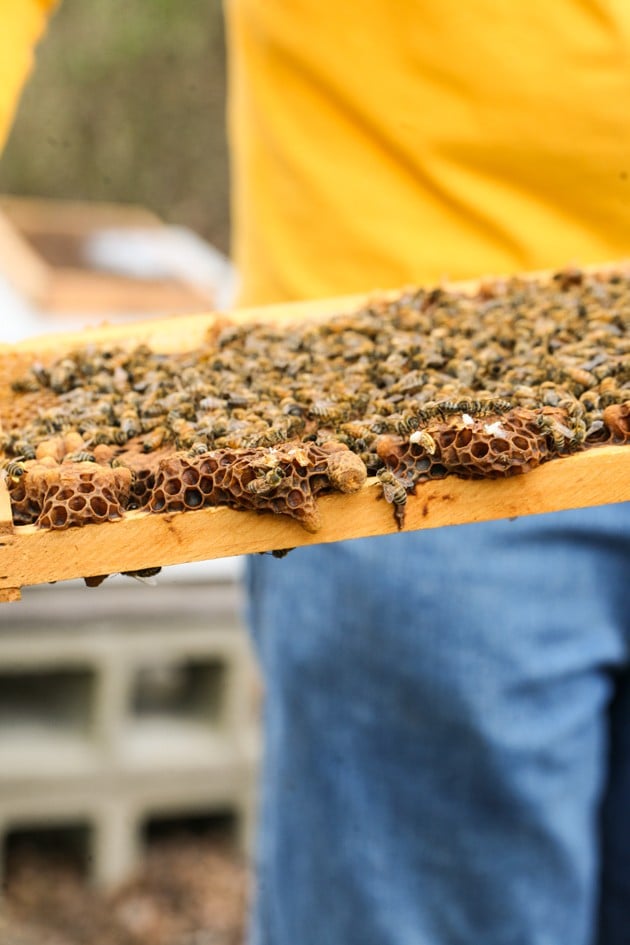
Do muscovy ducks need a pond like geese and other ducks?
No. I have some ducks that are in the fence with the chickens. I have a couple of black rubber tubs (the ones they sell at Tractor Supply) for them and they are just fine with those. They just make a mess so you’re going to have to clean them often.
I was thinking that these ducks that Lady Lee was talking about were pets. So it was disturbing when she started commented that they were delicious to eat. Sorry, not sorry, I’m a vegetarian. However the beginning of the article was very informative.
You can raise them as pets. They can be very friendly if you handle them from a young age. We have one male that we raised (I can’t remember what happened to him mama) and he’ll let the kids pick him up and play with him. However, they are also great meat animals to those of us who want to raise our own meat.
Hi, I was wondering what the average life span is. Thanks
These ducks can live up to 20 years.
we loved your writing. keep it up!
Thank you! And thanks for stopping by!
I want to to thank you for this excellent read!! I absolutely enjoyed every bit of it. I’ve got you book-marked to look at new stuff you post…
I’m so happy it was helpful! Thanks for stopping by.
Hi Lee,
This has been a great read thanks. We are taking some mature Muskovies from a friend in a week or so & would like to know how best to treat them for the first few days to make them feel settled & at home. We live in northern England, so a bit cold but not too bad, on a farm with nobody around us. We even have a duck pond about 100 yards from the house. We are hoping they will make their home in the small back garden where our chickens are, nicely enclosed away from foxes but they will be able to come & go as they please. Any suggestions on how to help them make the back garden their home would be very much appreciated.
Sounds like you have the perfect space for them. They should be very happy there!
For the first week or so, you can try to keep them in a fenced area (if the back garden is fenced that would be perfect). Feed them at the same time every day. They will roam around but will get used to coming back for breakfast/dinner.
I have a friend that placed a little coop for them where she wanted them to stay. She closed them in it for a few days, they got used to it and now that’s their home. You really can’t know since they are wild… They might decide that they like to nest around the pond or somewhere else. But they’ll stay around.
Thank you! I just got two females and a male and am having so much fun watching them enjoy our spring-fed pond. I have read mealworms are a nice protein and fat treat too!
Yes, all feathered animals love mealworms. I’m glad that you are enjoying them! I love these creates.
can i see pictures of the ponds or swimming areas.
I currently have a childs plastic pool with a step for him to get out by.
You can see the pond that I have close to my home in my video about Muscovies on YouTube here: https://youtu.be/VokLk9zcIkM
In South Florida people are cruel to the Muscovy ducks. They say they’re an invasive species even though they have been here for a couple hundred years. The Florida Wildlife associations do not protect or provide care for injured ones as they do for other birds. People take it on their own to kill them. It is very sad to see this treatment. They’re beautiful and gentle birds. I love that they eat the insects from my yard. I love watching what good mothers they are. However, I think you have an error in you article. From my observations the mother stays with the ducklings for about ten weeks. Then she starts leaving them, but still checks in from time to time in the next several weeks thereafter. The ducklings cannot fly until a few months old.
That’s sad. They are really great birds. It’s hard to come by an animal that literally takes no effort from a homesteader yet gives back so much. They are a vital part of my homestead and, honestly, my personal well-being. It was a nightmare working or sitting outside on the porch before I started raising them (because of the mosquitos and flies).
I might need to update a few things in the article. I’ll take a look. Thanks for stopping by!
Hi Lee, thanks for this information paper on the Muscovy ducks. I am Leonard from Papua New Guinea. I love Muscovy ducks. For your information, I am now planning to raise 5,000 Muscovy hens and 1,666 drakes using the mating ratio of 1:3, one drake to three hens. If you are close to Papua New Guinea I will have you visit my project and provide some basic assistance. After reading your article I see you as an experienced person in Muscovy ducks and thank you again for the great information.
Oh wow! This is exciting. Are you raising them for meat?
thanks for your info i was wondering when is the best time to butcher young muskys while they have down feathers or regular feathers and can i use a plucker
When they are fully grown which means that they will have their feathers. I find that they are ready for butchering around 3-4 months but can go a little longer as well. Search the blog for “how to butcher a duck”. I have a step by step tutorial on how and when to do it.
Thank you for all of this helpful information. I have 2 Muscovy drakes about 5-6 months old. A female started visiting my home about 18 months ago and I fell in love. I haven’t seen her for awhile. I have a small pond and the boys love it.
They are amazing ducks. Real easy, fun, and useful to have around!
i bet she is on a nest
Great site! My friend has a male and female that have come to their pond (FL). The female laid eggs and hatched two ducklings. Will the ducklings be colored the same as the parents?
Thank you!
Probably not! They have so many colors and one nest can have babies of all colors. I don’t think that their colors have anything to do with their parents.
Sharon
I live in south Florida and there are many free-range Muscovy ducks. You mention that they only have about 10 or more eggs when they lay. Ducks here lay 20 or more and it is heartbreaking to see all those babies when she finally brings them out knowing that more than 1/2 of those sweet, little, vulnerable babies will be dead in the first week or so. I saw a crow pick one up and take it off and eat it.They also fall down drainage holes. They are also vulnerable to drivers. They go out into the street after a large rain and drink water. Cars just run over them. It is so sad. I wish I didn’t feel this close to them but I do. I guess my question is “is it normal to have so many babies?”
What I meant is that the mama duck will start sitting on a nest when there are ten or more eggs in it. I had nests of 17 babies. Yes, it’s normal to have large nests like that. And unfortunately, even here in the country, it’s normal to lose something like 50% of the babies if the duck free range. They drown, get eaten by raccoons or many other animals, and so on. The only solution is to take them away from their mama and raise them in a brooder until they are old enough. I choose not to do it. It’s just how nature works.
thats the way nature keeps the ball rolling by having large family’s but i also hate seeing the loss of young and i’m a guy
Great article full of information. I live in a Triad NC golf community with a long pond on far side of fairway. I contributed some muscovies several years ago and have replenished once. My source has since become unavailable. This year there been sufficient additions to the flock. For future reference, do you ever sell muscovies?
Yes! I have babies all the time during the spring and summer so if you ever need any feel free to reach out!
Hi,
We have chickens now. It’s really convenient that they put themselves to bed every night. I have plenty of land for my birds to free range, and I like seeing them so happy. We have a couple creeks, a small orchard, and I love the idea of muscovies, but I have young kids, and we’re occasionally out late past dark or otherwise busy with family stuff. Do the muscovies need to be “manually” put to bed each night like ducks? I’m trying to think up a solution.
Absolutely not! They completely take care of themselves. I throw my Muscovies a couple of cups of feed in the morning (just so they get used to coming back to the same spot every day and so they get used to me), and that’s about all I do. They walk around, forage, swim, and put themselves to sleep. They sound perfect for you! They are really low maintenance.
Thank you so much for your article. I have 3 that are about 2 weeks old and love them. But I want to learn all I can about raising them. I am in Michigan!
They are really simple and amazing ducks! Also, check out my YouTube channel for a video about them. Thanks for stopping by!